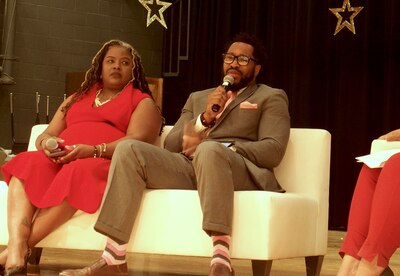When Se’Quoia Allmond’s cousin was shot and killed last year, she was “mad at the world,” she said. Though she felt cared for by her grieving family, she said she needed another outlet to convey her grief. She eventually saw a counselor and slowly began to express her emotions.
“Some people feel they should bottle up their emotions, but eventually you get to a breaking point,” she said. Counseling “relieved the stress. In counseling, they can’t judge you.”
She and other students at Whitehaven High School on Thursday shared their experiences of accessing mental health services and how school staff can help them cope with the effects of trauma.
Related: If teachers aren’t equipped to help trauma victims, students suffer. Learn from my story.
The student reflections came after the entire high school heard from a panel of mental health professionals to kick off a daylong career expo.
Shelby County Schools has long operated a mental health center licensed by the state exclusively for its students, the only one of its kind in Tennessee. The district has recently funded more counselors, behavior specialists, and social workers to address emotional turmoil that may result from poverty or trauma.
That’s especially important for students in Shelby County, where a higher than average share of children have experienced two or more traumatic events, such as abuse, witnessing violence, or the death of a family member, according to the 2016 National Survey of Children’s Health and the Data Resource Center for Child & Adolescent Health.
School counselor Traci Townsel and district spokesperson Tiffani Perry, both Whitehaven graduates, moderated the talk. Also on the panel were Timothy Terry, a therapist who got his start in alternative schools, and Rosiland Davis, who handles the district’s discipline and enrollment.
Across the front of the stage of the auditorium where the panel was held, large wooden letters spelled “mind, body, spirit” as staff donned “WEZ Strong” T-shirts — a nod to the neighborhood program for school improvement known as the Whitehaven Empowerment Zone.
Davis told students that bullying is “epidemic across the country” and said many of the student offenses that result in expulsion start as cyberbullying on social media.

Terry said he decided to enter the field of mental health when he was a teacher to help hyperaggressive students. And without strong relationships with adults, students are less likely to be open about their problems before they begin acting out.
“Parents do tell kids, ‘Hey, we don’t talk about what’s going on in our house. So, you be quiet about it,’ ” he said. “So, students come to school struggling with their sexual orientation, they don’t have anybody to talk to, they may have been abused — whatever’s going on in the home.”
Talking about the importance of student mental health, was “needed” and “eye-opening,” said senior Kanah Myers and junior Angeles Rosales.
“Sometimes some people don’t realize something is wrong,” Myers said. “But there’s always better help, professional help.”
She and other students named several teachers who have become like uncles and aunts to them. School staff “have to give you time to cry and adjust before we’re OK… Counselors don’t have time, but we have more teachers than counselors.”
To senior Keith Newsum, teachers are “really like teachers plus counselors.”
Rosales agreed, adding that those relationships are crucial when tragedy strikes, such as sexual abuse.
“There’s a stigma to talk about it,” she said of her network of Mexican family and friends. “No one wants to acknowledge those statistics.”
Allmond said her advice to teachers would be to “have open discussions… be more than a teacher to them, an outlet. Because you don’t know what they are going through.”

